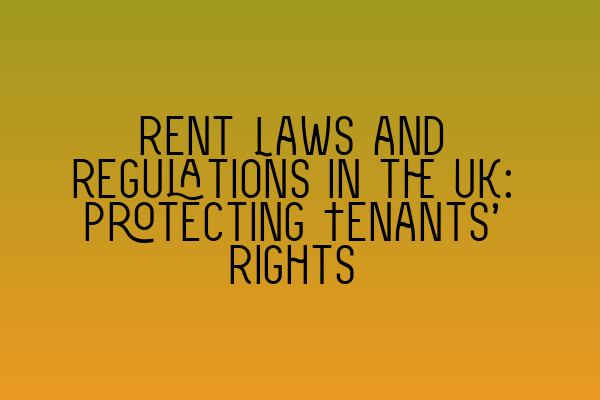Rent Laws and Regulations in the UK: Protecting Tenants’ Rights
Renting a property is a common practice in the UK, with many individuals and families relying on rented accommodations as their primary homes. As a tenant, it is crucial to be aware of the various rent laws and regulations in place to protect your rights and ensure a fair and secure tenancy. In this article, we will explore the key aspects of rent laws in the UK and how they safeguard tenants’ interests.
1. The Housing Act 1988: The foundation of rent laws in the UK, the Housing Act 1988 established two types of tenancies – Assured Shorthold Tenancies (ASTs) and Protected Tenancies. Most private rentals fall under ASTs, providing tenants with a fixed-term contract usually lasting six to twelve months. Protected Tenancies, on the other hand, are less common and offer stronger tenant protections.
2. Rent Increases: Landlords are legally entitled to increase rent during the tenancy, but the process is regulated to prevent unfair practices. In most cases, a landlord must provide written notice of the proposed rent increase at least one month in advance. The amount of increase must also be reasonable, taking into account local market rates. However, certain tenancies, such as social housing, have greater restrictions on rent increases.
3. Tenancy Deposit Protection: When renting through an AST, your landlord is obligated to protect your tenancy deposit in a government-approved deposit protection scheme. This ensures that your deposit is safeguarded and can be returned to you at the end of the tenancy if no deductions are warranted. If the landlord fails to adhere to this requirement, they may face legal consequences.
4. Repairs and Maintenance: Landlords have a responsibility to maintain their properties, ensuring they meet safety and habitability standards for tenants. Any repairs or necessary maintenance should be promptly addressed to ensure the property remains in a livable condition. If a landlord fails in this duty, tenants have the right to take legal action or seek assistance from local housing authorities.
5. Evictions and Notice Periods: In certain circumstances, landlords may need to evict tenants. The Housing Act 1988 outlines the legitimate reasons for eviction, such as rent arrears, breach of tenancy agreement, or the landlord requiring the property for personal use. Depending on the situation, different notice periods must be given to tenants, ranging from two weeks to six months. It is essential to understand your rights as a tenant if faced with eviction.
By familiarizing yourself with these essential aspects of rent laws in the UK, you can ensure that your rights as a tenant are protected. Additionally, understanding the legal framework surrounding tenancies empowers you to make informed decisions and take appropriate action if necessary.
If you require further guidance or have specific questions about rent laws, it is advisable to seek professional advice from a solicitor specializing in property law. For further insights on legal topics related to contracts and rights, you may find the following articles useful:
– Understanding Contractual Capacity: Rights and Limitations
– Interactive SQE Mock Tests for Contract Law: Test Your Knowledge
– Join Our SQE Contract Law Webinars: Expert Insights and Guidance
– Contract Law Reforms: An Analysis of Recent Changes
– Parties in a Contract: Rights and Responsibilities
Remember, being informed and understanding your rights as a tenant is crucial for a secure and fair tenancy. Stay knowledgeable, stay protected!
